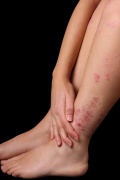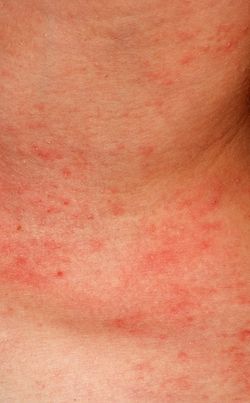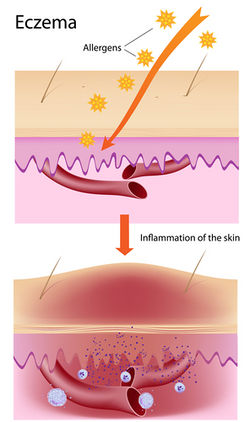Eczema, Atopic Dermatitis
| Article | Atopic Dermatitis, NDNR , 2012 May |
|---|
| Article | Dermatitis Herpretiformis, Familiar and Unknown, NDNR, 2011 May |
|---|
| Article | Probiotics for the Prevention of Childhood Eczema , Natural Medicine , 2011 May [1] |
|---|
Eczema, also known as dermatitis is a term that is used to apply to a wide range of persistent skin conditions. It is a very common condition with a prevalence of 2.4% to 7% in the population.[1] It is considered both an inflammatory and allergic skin reaction that affects that outer layer of the skin. It is typically characterized by erythema (red), inflamed, flaking and itchy or dry areas of the skin. It is commonly found on the face, wrists, and insides of the elbows and knees. It can occur at any age and is common in infants.
Naturopathic Assessment
The assessment of eczema is primarily done by observation of the skin. A detailed history and diagnostic testing is often required to confirm the causal factors.
Causal Factors
The causes of eczema are varied. Overall it is due to a disturbance or reaction of the immune system that is being expressed through the skin.
Lifestyle
- Food Sensitivities can be the cause or an aggravating factor. Foods known to trigger eczema include: cow's milk, eggs, cheese, fish, sugar, and food additives.[2]
- Alcohol use is associated in development of discoid eczema [3]
| Check out this book | The Clear Skin Diet |
|---|
- Frequent bathing or showers can increase the susceptibility.
Social
- Emotional tension can provoke and aggravate itching in patients with eczema. Individuals with eczema tend to show higher levels of anxiety, hostility and neurosis. [4]
- Stress response is a factor connected to Atopic Dermatitis in that the sympathetic response is elevated and parasympathetic response is dysfunctional in those suffering from atopy. This is exacerbated by the itching and scratching cycles experienced in those who suffer from eczema. [5]
Environmental
- Environmental Allergens
- Contact to specific plant allergens such as poison ivy, oak, or sumac can cause contact dermatitis.
- Atopic dermatitis is also associated with environmental factors like pollution, allergen exposure and increase of industrialization and housing development [6].
- Environmental Allergies to pollen, mold, dust mites or animals can cause dermatitis.
| Article | Atopic dermatitis: Understanding the role of innate immune function, IHP, [2], Nov/Dec 2010 |
|---|
- Acute eczema with vesicles can occur at distant sites from an acute fungal infection or Candida infection. [7], [1]
- Colds and Flu may make atopic dermatitis worse.
- Environmental toxins such as nickel.
- Climate and Seasons
External
- Preservatives in personal care products and rubber additives
- Fragrancces or dyes added to skin lotions, soaps or other personal care products.
- Household
- Repeated water, solvent, or detergent exposure.
- Contact with rough materials (like wool) and synthetic fabric.
Medical Interventions
- Prescription Medications
- Topical medications such as bacitracin, neomycin, and benzocaine fragrances can cause eczema.
Genetics
- Family History
- There is a positive family history in two thirds of eczema patients.[1] The family connection may be linked to food allergies or food intolerances.
- Loss of function of the gene for filaggrin is implicated as causing barrier defects leading to increased exposure to allergens through the skin [9].
Common Questions
When assessing eczema your naturopathic doctor will examine your skin and inquire about the following:
- When did your dry condition develop?
- Is it acute or chronic?
- What makes it better or worse?
- What are your hygiene habits?
- What other symptoms are associated with the eczema
- What impact does it have to your health and activities of daily living?
- What are your other health concerns?
Diagnostic Testing
- Laboratory testing can include: Food Allergy Test (IgE), Food Sensitivity Test (IgG), Basal Body Temperature, ferritin, serum Copper, selenium, Indican Test, Candida Test
Related Symptoms and Conditions
- The following symptoms and conditions are associated with increased risk of eczema or atopic dermatitis.[9], [7], [1], [7]
- Hypochlorhydria
- Dry Skin
- Allergic rhinitis
- Asthma
- Herpes simplex
- low Ferritin, high copper
Characteristics
The characteristics of eczema include:[1]
- Eczema is characterized by inflammation, erythema, edema and vesiculation.
- Itching is often severe and can result in sensitive skin. Those with eczema may have a lowered threshold to the itch stimuli (an excess of substance P).
- Weeping or oozing of acute lesions is typical.
- Thickening of the skin may eventually occur because of repetitive rubbing and scratching.
- Dry, hyperkeratotic skin which has decreased water-holding capacity
- The skin has a tendency to be heavily colonized by bacteria, especially Staphylococcus aureus.
- Serum IgE is elevated in 80% of patients and all patients have positive skin, radioallergosorbent tests and other allergy tests.
Location of the rash The type of rash and the location on the body depends on age:
- Young children: skin lesions begin on the face, scalp, hands and feet. They are often crusting, bubbling or oozing rashes that itch.
- Older children and adults: the rash is commonly seen on the inside the elbows and knees, as well as the neck, hands and feet.
Types of Eczema
- Atopic dermatitis
- Stasis dermatitis
- Contact dermatitis
- Nummular eczema
- Seborrheic dermatitis
Energetics of Eczema
- From a TCM perspective Eczema is viewed as Heat and Dampness picture.
Naturopathic Treatment
The goal of naturopathic treatment is to support and work in tandem with the healing power of the body and to address the causal factors of disease with individual treatment strategies. Eczema is considered a chronic disease.
The most important step is to identify and avoid anything that makes the skin condition worse. Treatment is typically more effective when it involves topical creams that provide relief from the itchiness and supplementation to reduce the inflammation, allergic responses and the underlying immune and metabolic abnormalities. An episode of contact dermatitis can take up to 3 weeks to resolve.
It is always advisable to work with a naturopathic doctor before engaging in any treatment plan.
Home Care
Home Care strategies include:
- The first step of any treatment plan is to maintain a diary of symptoms tracking diet, activity level, stress and other outside influences that may be triggering a flare-up.
- When washing or bathing use cooler water. Short, brief exposures to water are best.
- Do not scrub or dry the skin too hard or for too long.
- After bathing use a chemical-free, natural moisturizer.
Avoid Scratching
- Scratching open a healing lesion may result in scarring and may enlarge the rash.
- The use of chemical-free, natural moisturizers can decrease the inflammation and itching.
- Keep fingernails, especially a child's, cut short to minimize additional skin damage due to scratching.
Other Home Care Strategies
- Use chemical-free soaps and cleaners. Avoid anything that is known to cause, irritate or aggravate the skin.
- Avoid rough-textured or irritating clothing.
- A humidifier may assist in decreases the dryness of the skin.
- Stress relieve through exercises, mindfulness or meditation are often beneficial.
- Increase the skin's exposure to sunlight.
Lifestyle
Lifestyle recommendations include:
- Dietary recommendations
- The most important step is to identify and elimiate food allergies or sensitivities. Most individuals improve with an elimination diet.[1] Cow's milk is the primary culprit. Other key food allergens in eczema are eggs, tomatoes, peanuts, and food preservatives and food colourings. To a lesser extent fish, soy, wheat, citrus, and chocolate.[10], [1] The exact food triggers is very individual. Tracking what you eat and your skin's reaction is often beneficial in identifying triggers.
- Eliminate intake of alcohol, caffeine, spicy or greasy foods, sugar and chocolate.
- Ensure a high fiber diet.
- Consume green and yellow vegetables rich in Beta-carotene.
- Ensure you drink adequate water.
Naturopathic Therapies
The prescribing of naturopathic therapies requires the guidance of a naturopathic doctor as it depends on a number of factors including the causal factors, a person's age, prescription medications, other conditions and symptoms and overall health. It is always advisable to work with a naturopathic doctor prior to taking any natural therapies.
Naturopathic Therapies for eczema (atopic dermatitis) include:
- Nutritional Foods include:[11]
- Fruits such as guava, guava leaf.
- Fish & Shellfish such as freshwater clam
- Clinical Nutritional Supplementation includes
| Article | Probiotics for the Prevention of Childhood Eczema, NMJ, [3], 2012 January |
|---|
- Minerals such as Selenium, Zinc, Copper, Iron
- Other supplements such as Flax Seed Oil, Essential Fatty Acids, Acidophilus, Evening Primrose Oil, Quercetin and other Bioflavonoids, Betaine HCL, Brewer's Yeast
- Botanical remedies such as Burdock (Arctium lappa), Cleavers (Galium aparine), Coleus (Coleus forskolii), Dandelion Root, Echinacea (Echinacea angustifolia), Licorice (Glycyrrhiza glabra), Nettle (Urtica dioica).[12], [13] Other herbs include Red Clover (Trifolium pratense), Cleavers (Galium aparine), Heartsease (Viola tricolor), Figwort (Scrophularia nodosa), Calendula (Calendula officinalis), Common Plantain (Plantago), Goldenseal (Hydrastis canadensis)[14], Turmeric (Curcuma longa)
- Diaphoretic herbs aid the skin in the elimination of toxins and promote perspiration.
- Topically: Chamomile (Matricaria recutita), Witch Hazel (Hamamelis virgiana), Aloe (Aloe vera), Oats (Avena sativa), Olive (Olea europaea), Thyme (Thymus vulgaris).
- Gemmotherapies such as Cedrus libani, Equisetum arvense, Ilex aquifolium, Juglans regia, Platanus orientalis, Ribes nigrum, Rosa canina, Ulmus campestris, Viburnum lantana
- Homeopathic remedies such as Arsenicum, Graphites, Nat mur, Petroleum, Sulphur, Tuberculium, Rhus tox, Psorium.[15], [16]
- Also consider; [17] Anacardium orientale, Antimonium crudum, Calc carb, Kali muriaticum, Manganum aceticum, and Mezereum.
- Complex homeopathics are often beneficial to aid detoxification, decrease symptoms or to support skin healing.
- Traditional Chinese Medicine & Acupuncture recognizes the diversity in the symptom patterns that contribute to eczema. The different TCM strategies include:[18]
- Cool Blood, Detoxify Poision and Drain Damp-Heat
- Cool Blood, Detoxify Fire Poison and Dissipate Blood Stasis
- Drain the Spleen and Detoxify Fire Poison
- Cool the Blood, Detoxify Fire Poison and Drain Damp-Heat
- Cool the Blood, Detoxify Fire Poisons and Scatter Wind
- Cool Blood, Detoxify Fire Poison and Scatter Wind
- Clear Yin and Blood, Vent Heat and Detoxify Fire Poison.
References
Reviewed by Iva Lloyd, BScH, RPE, ND [4]
- ↑ 1.0 1.1 1.2 1.3 1.4 1.5 1.6 Murray Michael Atopic Dermatitis (eczema) Natural Medicine Journal, 1999 Vol2:4
- ↑ Hoffman D (2003) Medical Herbalism: The Science Principles and Practices Of Herbal Medicine. Healing Arts Press.
- ↑ Kazakevich N, Moody MN, Landau JM, Goldberg LH (2011) Alcohol and skin disorders: with a focus on psoriasis. Skin Therapy Lett.;16(4):5-6 PMID: 21611681
- ↑ Jordan J, Whitlock F (1972) Emotions and the skin: The conditioning of scratch response in cases of atopic dermatitis. Br. J Dermatol;86:574-584.
- ↑ Tran BW, Papoiu AD, Russoniello CV, Wang H, Patel TS, Chan YH, Yosipovitch G (Jul 2010) Effect of itch, scratching and mental stress on autonomic nervous system function in atopic dermatitis. Acta Derm Venereol.;90(4):354-61. PMID:20574599.
- ↑ 6.0 6.1 6.2 Gutierrez EL, Galarza C, Ramos W, Mendoza M, Smith ME, Ortega-Loayza AG (2010) Influence of climatic factors on the medical attentions of dermatologic diseases in a hospital of Lima, Peru. An Bras Dermatol;85(4):461-8. PMID:20944906.
- ↑ 7.0 7.1 7.2 Campbell James, Chapman Shane, Dinulos James, Zug Kathryn (2005) Skin Disease, Diagnosis and Treatment, Elsevier Mosby
- ↑ Thomas KS, Dean T, O’Leary C, Sach TH, Koller K, et al. (2011) A Randomised Controlled Trial of Ion-Exchange Water Softeners for the Treatment of Eczema in Children. PLoS Med;8(2):PMC3039684.
- ↑ 9.0 9.1 Patrizi A, Pileri A, Bellini F, Raone B, Neri I, Ricci G. (2011) Atopic dermatitis and the atopic march: what is new? J Allergy (Cairo) 2011:5 PMID:21941575
- ↑ Murray Michael 1996 Encyclopedia of Nutritional Supplements, The Essential Guide for Improving Your Health Naturally Prima Publishing
- ↑ Lu Henry (1986) Chinese System of Food Cures, prevention and remedies Sterling Publishing Co. New York.
- ↑ Godfrey Anthony, Saunders Paul Richard, Barlow Kerry, Gilbert Cyndi, Gowan Matthew, Smith Fraser 2010 Principles and Practices of Naturopathic Botanical Medicine, Vol 1: Botanical Medicine Monographs, CCNM Press, Toronto
- ↑ Boon Heather, Smith Michael 2004 The Complete Natural Medicine Guide to the 50 Most Common Medicinal Herbs, Robert Rose, Toronto
- ↑ Hoffmann David (1992) Therapeutic herbalism: A correspondence course in phytotherapy
- ↑ Hershoff Asa 2000 Homeopathic Remedies, A Quick and Easy Guide to Common Disorders and their Homeopathic Treatments, Avery Publishing Group, New York
- ↑ Ullman Robert, Reichenberg-Ullman Judyth 1997, Homeopathic Self-Care, the quick and easy guide for the whole family. Prima Publishing
- ↑ Rose Barry, Scott-Moncrieff Christina. Homeopathy for Women. 1999 Firefly Books.
- ↑ David Bray


